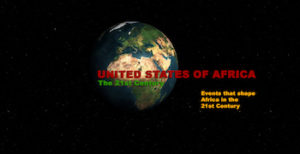
*On this date in 1924, we celebrate the United States of Africa. This is a proposed Pan-African-based concept of a federation of some or all of the 54 sovereign states, and two disputed states on the continent of Africa. The idea of a multinational unifying African state has been compared to various medieval African empires, including the Ethiopian Empire, the Ghana Empire, the Mali Empire, the Songhai Empire, the Benin Empire, the Kanem Empire, and other nation-states.
During the late 19th and early 20th centuries, the majority of African land was controlled by white European empires. The British controlled around 30 percent of the African population at its peak, resulting from the Berlin Conference of 1884. The term "United States of Africa" was mentioned first by Marcus Garvey in his poem Hail, the United States of Africa in 1924. Garvey's ideas and formation systems deeply influenced former African leaders and the rebirth of the African Union.
In February 2009, upon being elected chairman of the 53-nation African Union in Ethiopia, Libya’s Muammar Gaddafi told the assembled African leaders: "I shall continue to insist that our sovereign countries work to achieve the United States of Africa." The BBC reported that Gaddafi had proposed "a single African military force, a single currency, and a single passport for Africans to move freely around the continent". Other African leaders stated they would study the proposal's implications and re-discuss it in May 2009. The focus for developing the United States of Africa so far has been building subdivisions of Africa - the proposed East African Federation can be seen as an example of this. Former President of Senegal, Abdoulaye Wade, had indicated that the United States of Africa could exist as early as 2017. The African Union, by contrast, has set itself the task of building a "united and integrated" Africa by 2025.
Gaddafi had also indicated that the proposed federation might extend as far west as the Caribbean: Haiti, Jamaica, the Dominican Republic, the Bahamas, and other islands featuring a large African diaspora may be invited to join. Gaddafi also received criticism for his involvement in the movement and a lack of support from other African leaders for the idea. A week before Gaddafi's death during the Libyan Civil War, South African President Jacob Zuma expressed relief at the regime's downfall, complaining that Gaddafi had been "intimidating" many African heads of state and government to gain influence throughout the continent and suggesting that the African Union will function better without Gaddafi and his repeated proposals for a unitary African government. Gaddafi was ultimately killed during the Battle of Sirte in October 2011. While some regard the project to have died with him, Robert Mugabe expressed interest in reviving the project. Following the 2017 Zimbabwean coup d'état, Mugabe resigned as President. In September 2019, Mugabe died.
National Views
The nations of Eritrea, Ghana, Senegal, and Zimbabwe have supported an African federation. Others, such as South Africa, Kenya, and Nigeria, have been more skeptical, feeling that the continent is not ready for integration. North African countries such as Algeria, Morocco, Egypt, Tunisia, and post-revolution Libya have traditionally identified more with rival ideologies like Arab nationalism, Berberian, and Islamism. They have shown less interest in the idea. Doubts have been raised about whether the goal of a unified Africa can ever be achieved while ongoing problems of conflict and poverty persist throughout the continent.
Demographics
The proposed federation would have the largest total territory of any state, exceeding the Russian Federation. It would also be the third most populous state after China and India, with a population speaking an estimated 2,000 languages.